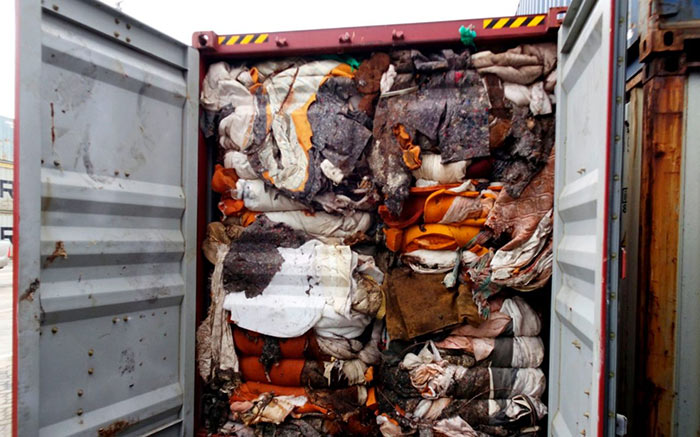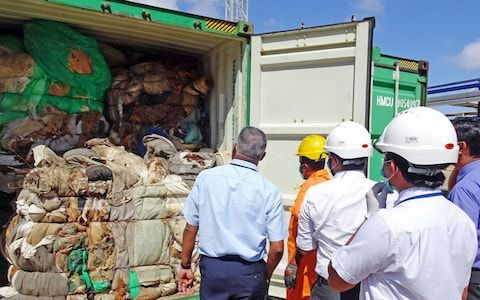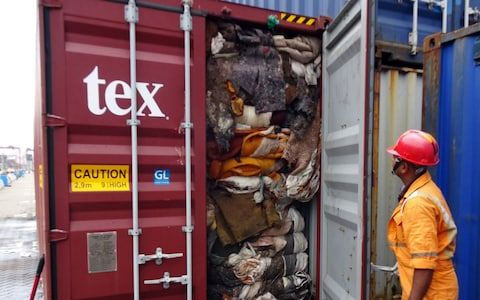Sri Lanka to send 100 containers of ‘human remains’ disguised as recycling back to UK

The British government has launched an investigation after Sri Lankan authorities said they would send back more than hundred shipping containers because they appeared to contain human remains disguised as recyclable metals.
Officials at the port of Colombo made the grisly discovery while investigating a strong smell emanating from 111 containers which have been arriving at the docks over the past two years.
Inside the crates, customs officials found the “extremely hazardous” materials mixed in with mattresses, plastics and clinical waste.
Defra was last night investigating reports that human organs and body parts were inside the container, but said it was yet to be approached by the Sri Lankan authorities.
“We are committed to tackling illegal waste exports, which is why individuals found to be exporting incorrectly described waste can face a two year jail term or an unlimited fine,” a spokeswoman said.
“We are yet to receive a formal request from the Sri Lankan authorities, but Defra has contacted them directly to find out more information.”
“This is a well-organised racket that has been going on since 2017,” said an official at Sri Lanka’s finance ministry, adding that they would raise the issue with the British authorities.
Sri Lanka is the latest country to clamp down on criminal groups which export mislabelled waste materials instead of recycling or incinerating them.
China, Vietnam, Malaysia and Thailand have also announced a crackdown on plastic imports as they attempt to stem the tide of waste from European countries which are unable or unwilling to dispose of it themselves.
Rohan Masakorala, a Sri Lankan businessman, was identified as the importer of the containers on Tuesday but has denied any wrongdoing and insists no human remains were inside.
However, a spokesman for Sri Lanka’s Central Environment Authority said: “The waste material brought to the country under the guise of mattresses from the UK is extremely hazardous.”
British waste disposal experts said disguising human remains as recyclable metals would be highly lucrative as it is illegal to export anatomical waste, such as human organs or body parts.
“Someone is making a killing out of this,” warned Dominic Hogg, the chairman of waste and recycling consultancy Eunomia.
“There is a major financial incentive to this, with hazardous material, because it was likely taken on the basis of being paid a lot of money to ensure it was disposed of correctly. You would potentially double your money if it were body parts or clinical waste.”
A spokesman for the British Metals Recycling Association said it “absolutely condemns” illegal exports of hazardous waste, which it blamed on a minority of rogue traders and criminals.
“Unfortunately, due to a lack of funding, containers are generally only opened by port officials if there is intelligence to suggest an illegal shipment is being attempted; we believe this results in just one in 1,000 containers being searched,” added Howard Bluck, the association’s technical director.
If the presence of British human remains in the containers is confirmed, it is feared they may have originated from NHS hospitals which are struggling to dispose of anatomical waste.
Last year, the Health Service Journal revealed that private contractor Healthcare Environment Services Ltd (HES) had stockpiled human waste from 50 NHS trusts, including amputated limbs, human organs and infectious liquid. HES lost all of its waste contracts and closed down in December last year, following the disclosure.
The excess waste levels had exceeded 350 tonnes in September, five times the 70 tonnes limit, with the remains being stored in fridges.
Garry Pettigrew, the company’s former director, has vehemently denied any involvement with the Sri Lankan exports and claimed in a message on Twitter that NHS contractors were illegally shipping the waste abroad.
It would not be the first time British waste has been implicated in a scandal over illegal exports and disposal methods.
The Telegraph revealed last year that a trash mafia operating in Poland was paid millions of euros to import plastic waste from the UK and set it alight in a field near the rural town of Zgierz.
(The Telegraph)


Latest Headlines in Sri Lanka
- Sri Lanka Governmet paid Rs. 1.22 Billion to 43 MPs as compensation for Aragalaya damages February 6, 2025
- Daughter of Lasantha Wickrematunge calls for impeachment of Attorney General February 6, 2025
- Tri-Forces and CSD lead Beira Lake clean-up under ‘Clean Sri Lanka’ initiative February 6, 2025
- Supreme Court to hear Mahinda Rajapaksa’s petition on security reduction on March 19, 2025 February 6, 2025
- Media outraged as AG moves to free suspects in Lasantha Wickrematunge murder February 6, 2025



That will be an excellent gift for the new British Prime Minister, Boris Johnson !
SL’s Environmental Minister, Hon Pallewatte Gamaralalage Maithripala Yapa Sirisena should send a note of felicitations to the new British PM along with this consignment.
Absolutely outrageous consignment!
EU and UK officials need to be notified asap, and pinned down to rectify the situation.
This threat to public health and the environment cannot be ignored.
We are not a dumping ground!
Perhaps U.K. public should be made aware that their body parts are stuffed in containers and shipped abroad, courtesy of their National Health Service.
Very eco-friendly gesture.
Thoughts from Green Peace?
We might be a lower income country, but unlikely that we would ever do this!
Dear Mr Masakorala
Human remains found in 100 containers of exported recycling sent from UK to Sri Lanka, 23 July 2019
“Human remains hidden in recycling shipments”, The Daily Telegraph, 24 July 2019
Your emails about this article have been passed to me to consider.
Let me say immediately how sorry we are about this error, which arose from a simple misunderstanding by one of our Foreign Desk staff. We obviously very much regret it. We will therefore publish the following in our usual ‘Corrections and Clarifications’ spot in the daily newspaper:
Rohan Masakorala: An apology
Our article “Human remains hidden in recycling shipments” incorrectly said that Rohan Masakorala was identified as the importer of containers brought into Sri Lanka that appear to hold human remains. In fact, neither Mr Masakorala nor his company have anything to do with the shipments concerned, and there is no suggestion that he is in any way involved. We sincerely apologise for the error.
We have also corrected the online article and added a version of the above, appropriate for context, at its foot.
I trust that this can resolve the matter.
Yours sincerely
Jess McAree
Head of Editorial Compliance
111 Buckingham Palace Road
London, SW1W 0DT
telegraph.co.uk
This is disgusting. 1. Who authorized these hazardous rubbish to enter Sri Lanka 2. Who released them from customs? 3. Is this is the policy of the UK government to send environmentally hazardous stuff to developing countries (or to a common wealth member)?